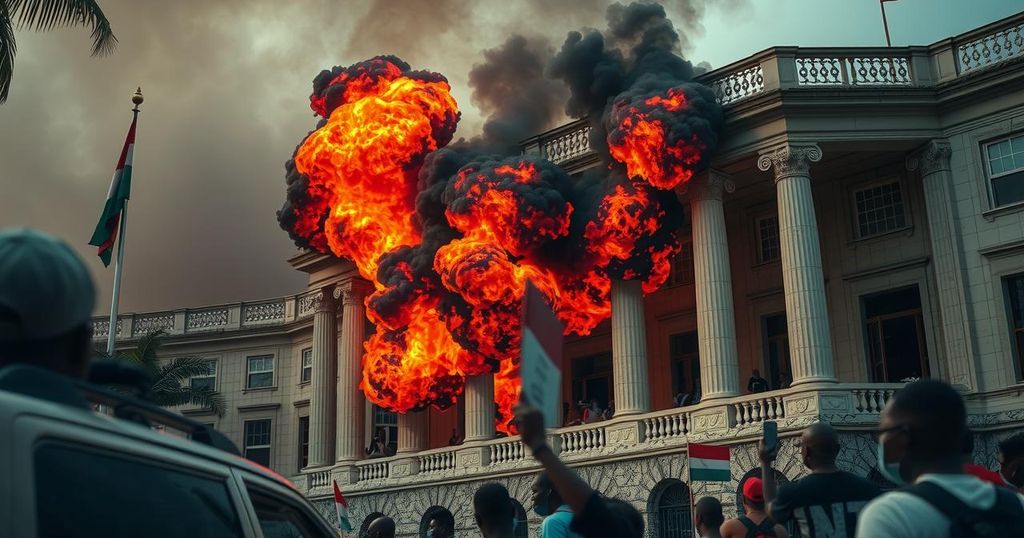Liberia’s Parliament Engulfed in Flames as Protests Intensify Against Corruption

Emergency services responded to a fire in Liberia’s parliament building amid ongoing protests by opposition against Speaker Konati Koffa, accused of corruption. President Joseph Boakai called for an investigation into the incident which follows police actions against demonstrators. Tensions are rising as protestors also demand the president’s resignation, further complicating the parliament’s ability to function amid legislative gridlock.
On Wednesday, emergency services in Monrovia, Liberia, responded to a fire that broke out in the parliament building during ongoing opposition protests against the government’s handling of political issues. The unrest has entered its second day, with public dissatisfaction directed towards attempts to remove House Speaker Konati Koffa over allegations of corruption. President Joseph Boakai condemned the incident, urging for immediate investigations into the circumstances surrounding the fire and labeling the destruction as ‘wanton.’ Law enforcement has previously faced criticism for deploying tear gas and arresting protesters to maintain order.
This incident marks the second fire at the parliament building within a single week, although there is currently no evidence linking both events. Local reports mentioned that authorities apprehended individuals present near the site of the latest blaze during their investigation. The continuing protests reflect the heightened tension in Liberia’s political climate, particularly regarding the fate of Speaker Koffa, who is entangled in corruption allegations that threaten the legislative process. Despite legal frameworks permitting the removal of a speaker by a two-thirds house majority, the parliament remains in a gridlock, hindering the passage of essential government budgets.
The protests highlight significant public discontent with the government and its accountability structures. As the opposition rallyers demand both the resignation of President Boakai and the removal of Speaker Koffa, the fallout from the charges against Koffa incites broader concerns about governance in Liberia. Recent events indicate that the atmosphere is charged, with growing frustration and civil unrest potentially impacting the nation’s political stability.
The political climate in Liberia is currently fraught with tension as accusations of corruption against House Speaker Konati Koffa have provoked widespread public protests. Citizens are demanding his removal as well as the resignation of President Joseph Boakai. The country’s legislative process is significantly stalled due to the inability of parliament to garner the necessary support to remove the speaker, which has resulted in a deadlocked situation that hampers governmental operations, including the passage of the annual budget. The recent violence surrounding protests displays the populace’s growing frustration with their leaders and their demand for accountability. The legislature can only remove a speaker through a two-thirds majority consent, leaving the government in a precarious position with no clear path forward. The incursion of protests and the recent incidents, including the fires at the parliament building, underscore the volatility of Liberia’s current political environment. Moreover, police operations to disperse protesters have led to growing scrutiny over civil rights and law enforcement practices, suggesting that tensions may escalate further if the grievances of citizens are not adequately addressed.
In conclusion, today’s events in Monrovia underscore a critical moment in Liberia’s political landscape, revealing deep-seated frustrations among citizens regarding governance and allegations of corruption. The ongoing protests reflect a broader demand for accountability and transparency from elected officials. With the parliament experiencing disruptions, including recent fires, the ability of the government to function effectively is jeopardized. As the situation continues to unfold, the implications for Liberia’s political stability remain significant and warrant close observation.
Original Source: indianexpress.com







